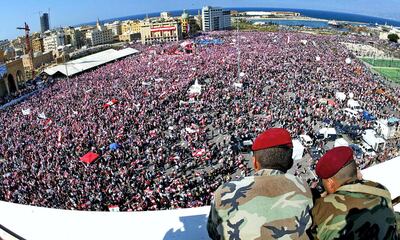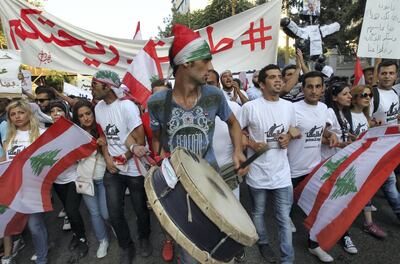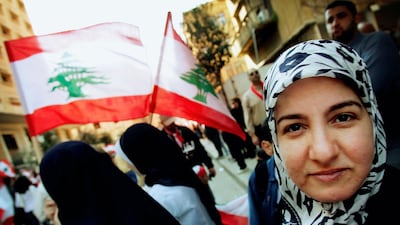As Lebanon's anti-government movement completes 100 days, The National spoke to activists about how the 2015 garbage protests and the 2005 uprising that pushed Syrian troops out of the country paved the way for its first nationwide "revolution".
Shirine Abdallah, 61, took part in all three protests. A fierce defender of the legacy of the 2005 protests, she believes “Lebanon’s 2019 protests would have never happened without 2005”.
Mrs Abdallah asked to meet in a cafe opposite the offices of the Annahar newspaper, where she once worked. The building looks out on to Beirut's emblematic Martyrs Square, where the Lebanese congregated each time to express anger at their leaders.
“People would never have been able to express themselves today without fear of repression,” she said.
In what was later dubbed the Cedar Revolution, hundreds of thousands of Lebanese gathered in Martyrs Square on March 14, 2005, exactly one month after prime minister Rafiq Hariri was killed by a massive car bomb in the Lebanese capital.
Syria, which had occupied Lebanon since 1976, was widely blamed for the assassination. Lebanese political parties hostile to its presence seized the moment to demand its withdrawal, which was completed within a month.
The protests ended but the country remained divided between two camps: those that supported the Cedar Revolution – the March 14 camp, and their pro-Syrian opponents, March 8.

Later that year, the editor in chief of Annahar, Gebran Tueni, was killed in a car bombing. Once again, eyes turned to Syria as Tueni had been an outspoken critic of Lebanon's bigger neighbour and the first to call for its withdrawal in print.
But his legacy lives on, said Mrs Abdallah, who was Tueni's chief of staff and still carries the Lebanese flag that she waved on March 14, 2005. In a famous speech delivered at the protest, Tueni, then 48, said: “In the name of God, we – Muslims and Christians – pledge that we shall remain united to the end of time to better defend our Lebanon”.
Fourteen years later, those same words were being repeated at anti-government rallies in Nabatieh, a southern city that is the stronghold of Amal, a political party known for its hostility to the protests.
For Mrs Abdallah, “this is huge. This is the same city that showed Gebran Tueni dressed as a rabbi in 2005.” Because of Lebanon and Israel’s troubled and unresolved past – they have never made peace – anti-semitic insults are a common way to slander political opponents.
Like many March 14 activists, Mrs Abdallah gives little importance to the anti-government movement that erupted a decade later.
Triggered by a waste-disposal crisis, they were known as Lebanon’s “garbage protests”. They petered out after a few months in early 2016, as politicians promised to resolve the crisis. “If you do not speak to me about it, I don’t even remember it," she said tersely.
A few minutes later, she corrected herself. “2015 was not that useless. The Lebanese started thinking about how frustrated they should be.”
It was the first time people questioned their government instead of blaming their problems on foreign powers; Syrian troops had left 10 years earlier.
That is the opinion of Lucien Bourjeily, 39, an activist and filmmaker who was working in the Gulf in 2005 but emerged as one of the leaders of the 2015 protests.
“Some people felt robbed in 2005," he said. Those protests "did not achieve a strong state, accountability and the provision of basic services that people are still asking for”.

Although 2015 protests yielded little reform, they did give birth to a strong civil society movement that took part in the 2018 parliamentary election. In April that year, the new government received pledges of $11 billion in loans from the international community to build up Lebanon's economy and infrastructure. But the reforms necessary to unlock the funds were never implemented.
As it became clear late last year that the economy was in free fall, a minister’s suggestion to tax WhatsApp, widely used to make free internet calls, proved to be the final straw. The protest movement it triggered is now called the “October 17 revolution” by activists.
Unlike in 2005 and 2015, the Lebanese took to the streets across the country, whatever their religion or social class. The economic crisis was the game changer.
“In 2005, the economy was doing good. In 2015, it was doing relatively good. But now, the economy is collapsing. That’s why protests are not central anymore, they are everywhere in Lebanon,” said Jad Ghosn, 43, who has taken part in all three protests.
Lessons have been learned from the past; no leaders were appointed this time. “We did not identify a core leadership that would be in a spotlight because it would be easy to target with a campaign of misinformation,” said Mr Bourjeily.
However, attempts were still made by Hezbollah and its allies to depict the protests as backed by foreign countries. Hezbollah leader Hassan Nasrallah warned his followers against taking part. There are noticeably less Shiite protesters than Christians or Sunnis.
Protesters tried to respond collectively to criticism. Videos were circulated on social media where dozens of people repeated: “I finance the revolution.”
The economic crisis has only become worse, further undermining trust in politicians. Banks have reduced cash withdrawals to a few hundred dollars a month. Inflation has soared.
Following Saad Hariri’s resignation as prime minister on October 29, a new government was announced last Tuesday. Critics say it is of “one colour” – or March 8 – because it is supported only by President Michel Aoun’s Free Patriotic Movement and its allies, including Amal and Iran-backed Hezbollah.
But it has vowed to tackle the crisis and for the first time, there are no traditional politicians in the cabinet, which comprises of mostly little-known specialists.
“I do not think that this government can do something [about the economic crisis]. They come from parties and were nominated by politicians and the same people who took us to this disaster, unfortunately,” said Mr Ghosn, who used to be a member of the Christian Lebanese Forces party which boycotted the new government. He quit before 2015.
“We are ready to make sacrifices, if we have a result. But these people do not convince us. Tomorrow and after tomorrow, people are going to take to the streets because parties can’t provide them with their basic needs anymore,” he said.
Mr Bourjeily agreed. “Politicians cannot hide economic problems like they hid the garbage crisis. They can lie all they want, but if someone cannot take out more than 100 or 200 dollars from the bank, then the lie does not mean anything," he said.
“But we cannot underestimate the political class. They have the security forces; own most of the media; they have money, inside and outside of Lebanon. There is always a risk they will get the better of us.”


